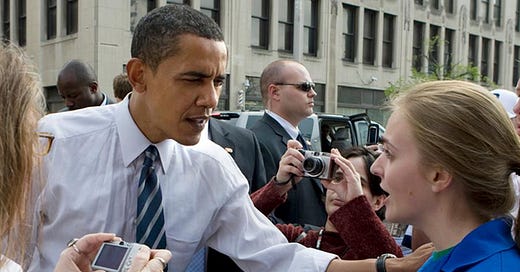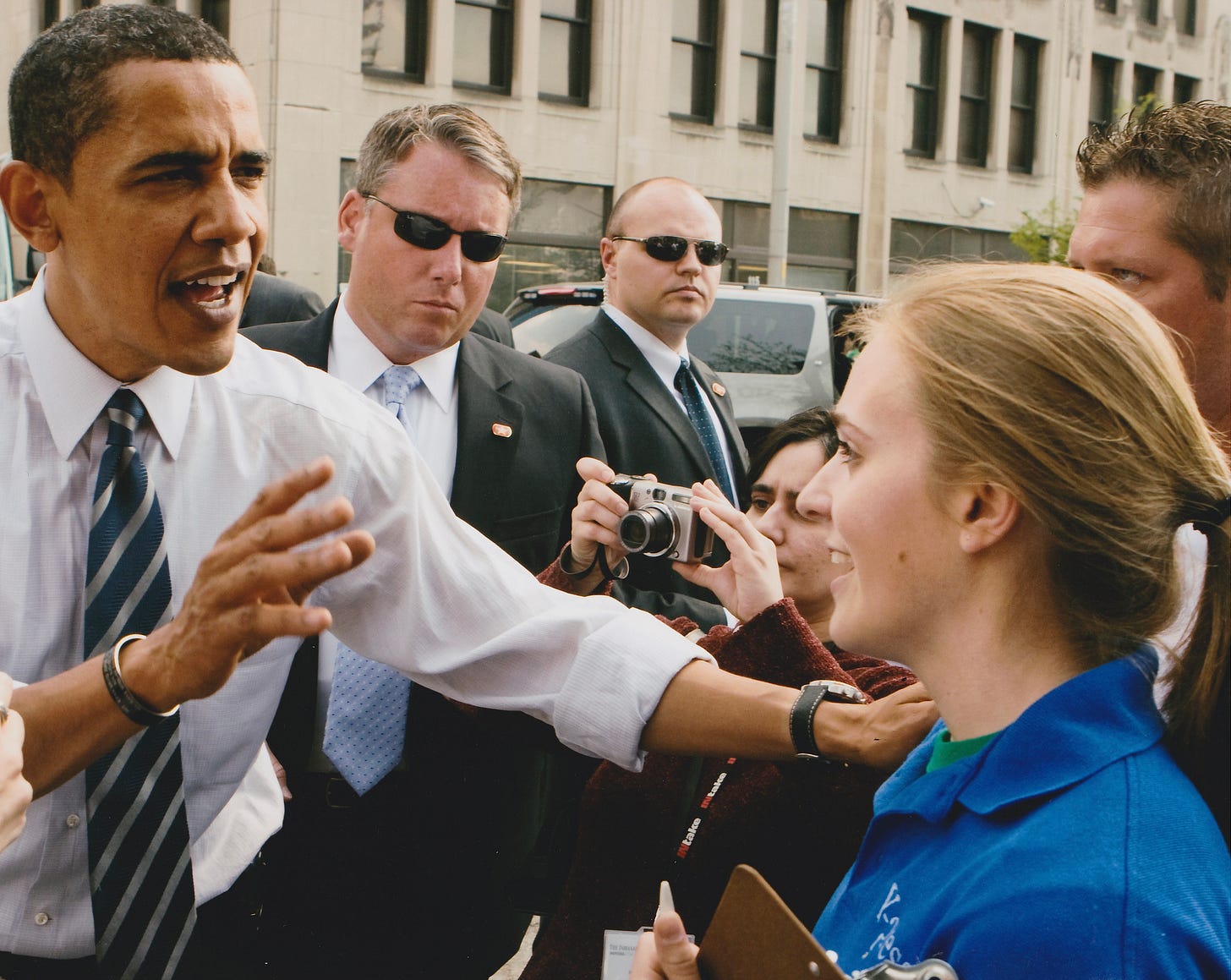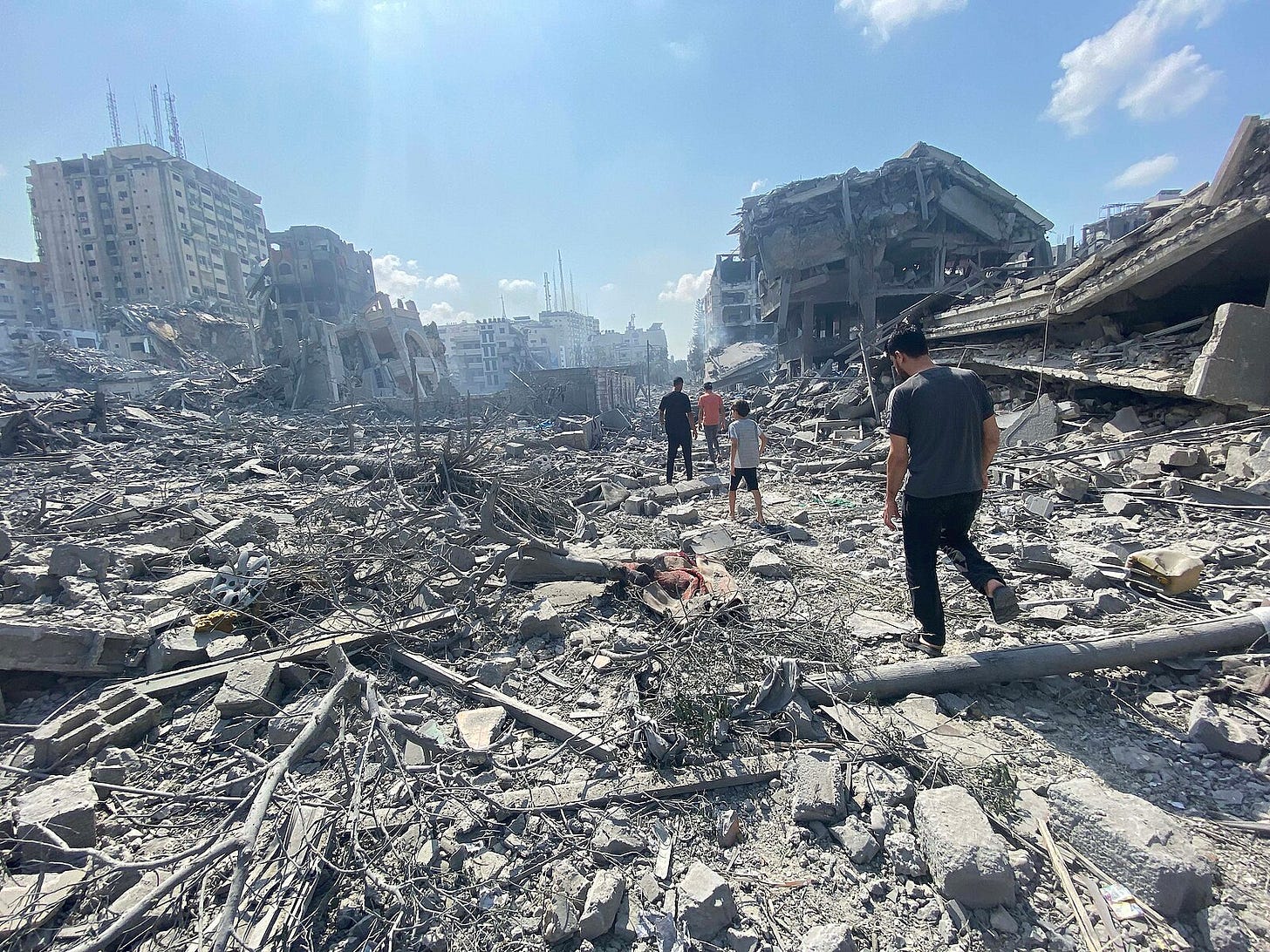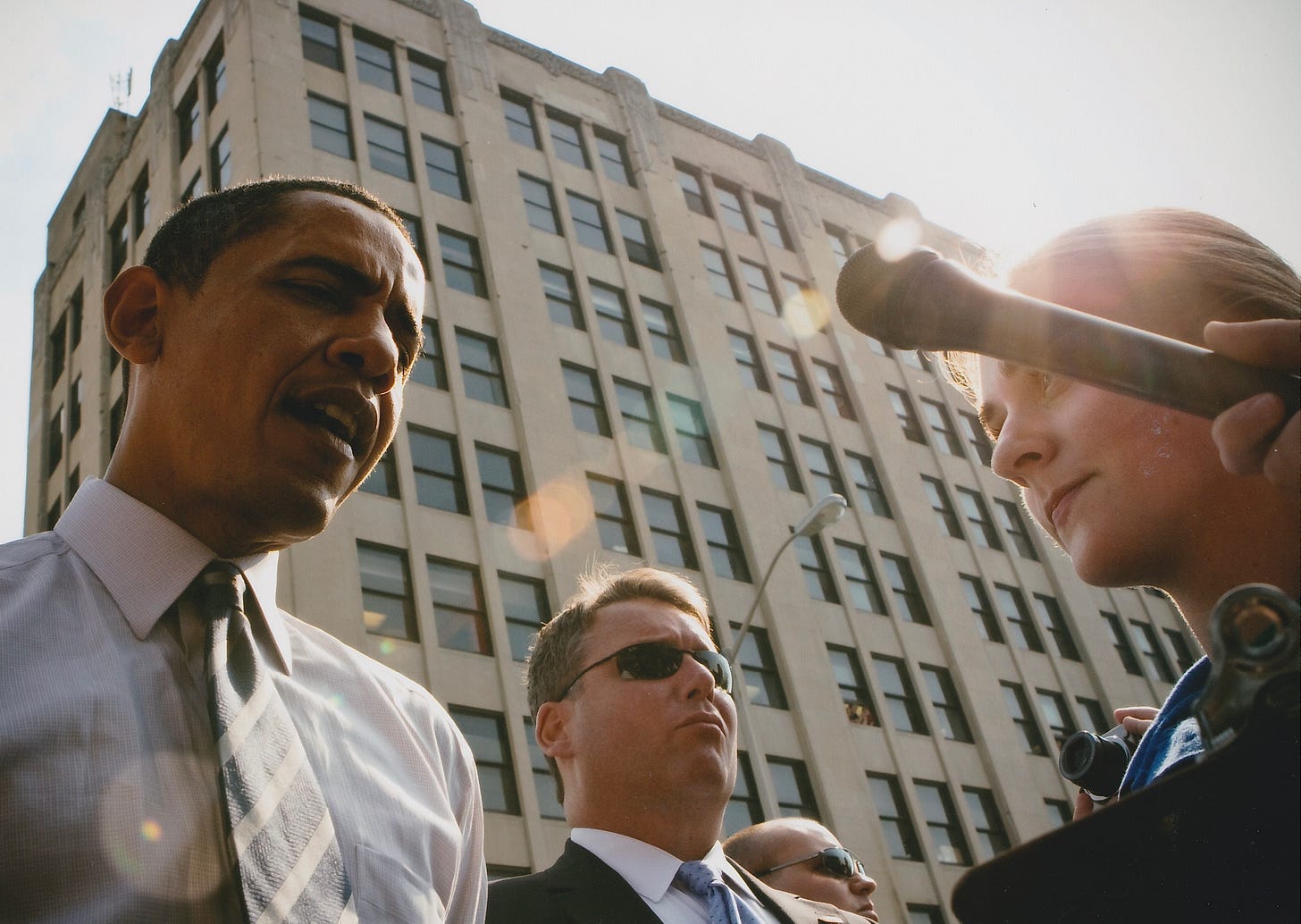The Time I Asked Obama about Palestine
Amid this year’s DNC and the persistent onslaught of Gaza, I reflect back on my 2008 interview with the future president
“I’ll give you two minutes,” Barack Obama said, turning to face me.
A high school junior, I had run through the streets of downtown Indianapolis, clipboard and pencil in hand, determined to score an interview with the future president of the United States. I was a youth journalist covering the 2008 presidential primaries and Democratic National Convention for an organization called Y-Press, and the opportunity for an interview with then-Senator Obama was literally right around the corner.
Obama had been visiting Indianapolis on a campaign stop, seeking the endorsement of the local newspaper, The Indianapolis Star. The paper’s building, which spanned an entire city block, housed Y-Press’s office, too, and my fellow journalists and I had been waiting around all afternoon, hoping that we could catch Obama as he was leaving the building.
It turned out that he and his entourage exited through a door on the opposite side of the complex from where we’d been staking out. We thought we’d missed our chance. Fortunately, though, I’d worn my tennis shoes that day, and I immediately started running around the block, the other two reporters following behind me with our tape recorder. (Yes, we still used tape recorders back then.)
When we finally made it to the parking lot, I yelled after him between gasping breaths. “Senator Obama, do you have a moment to answer a question from youth journalists?”
About to climb the stairs into his tour bus, he turned around.
“I’ll give you two minutes,” he said, and started walking toward me.
High on adrenaline, I felt nervous but determined to take advantage of this opportunity. As he and his Secret Service agents approached me, a large crowd assembled around us. He placed his hand on my right shoulder and, laughing, said, “Take a breath!” He probably thought I was hyperventilating about the prospect of interviewing him, not knowing that I’d just run around the block in the summer sun. After catching my breath, I posed my question, looking into his face as he looked intently into mine.
The future president likely did not expect what I was about to ask. Perhaps he thought he’d get an easy, softball question from an amateur seventeen-year-old reporter. But we Y-Pressers prided ourselves on asking hard-hitting, substantive questions. Just because we were kids didn’t mean we were childish in our political concerns or our reporting.
I first introduced myself and Y-Press, and then began by reminding the presidential candidate of the support he had received from young people, not just in the United States but all over the world. I then told him a story I’d read about a Palestinian college student in Gaza, Ibrahim Abu Jayyab, who was making telephone calls to the U.S. in between power outages, encouraging Americans to vote Obama into the presidency. This young man hoped that life in Gaza—which even back then was marred by violence, hunger, and lack of resources due to the Israeli blockade—would improve if Obama won. I asked the senator how, if elected, he might repay and help youth like Ibrahim, given the United States’ existing relationship with Israel. I wondered if and how he might be willing to rethink U.S. policy toward Israel and Palestine as president.
I sensed that the senator was caught off-guard, and he did not offer me a substantive response. During that summer, Obama’s campaign was trying to draw comparisons between him and the late Robert F. Kennedy, brother of President John F. Kennedy. So instead of taking the question head-on, he brought up RFK as part of a vague statement about how America needs to be a beacon of hope to the youth of the world. I was not impressed with the answer, but I remained optimistic that his Democratic administration might shift U.S. policy in the Middle East, including on Israel-Palestine. I hoped he would not disappoint me, not to mention the Palestinian youth from Gaza.
Fast-forward to today, when the situation in Gaza is infinitely worse than it was in 2008. In the wake of the Hamas’ attack in southern Israel last year, when around 1,200 were killed and around 250 taken hostage, Israel has killed over 40,000 men, women, and children, most of them civilians, and severely injured tens of thousands of others, in its relentless bombing campaign and ground assault in Gaza. Most of Gaza’s population has been displaced from their homes, multiple times, and families are living in unfathomable, inhumane conditions. Famine and disease are spreading, including among young children. Palestinians’ one route of escape (which involved hard-to-obtain permits, exorbitant exit fees, and a journey that was impossible for many) was cut off when Israel took over the border crossing from Gaza into Egypt in May, leaving two million people trapped in this horror.
The Democratic National Convention is taking place this week amid the ongoing slaughter in Gaza. The U.S. government, including recent Democratic administrations, has been complicit in what scholars and human rights groups have labeled a genocide, as well as in Israel’s longstanding policy of dominance over the Palestinians more broadly, which amounts to apartheid. Both Obama’s and Biden’s administrations have supported Israel financially, militarily, diplomatically, and rhetorically despite these atrocities and injustices. Despite my initial hopes in Obama, I grew increasingly disappointed with his approach to Israel-Palestine, which didn’t disrupt and served to enable the status quo. And as a Catholic, I’ve been deeply upset by the lack of action—and lack of empathy—of President Biden on an issue which, to me, is one of the clearest moral questions of our time.
It didn’t have to be this way. And it doesn’t have to be going forward. There are simple things that the next president (regardless of the party) could do to move Israel-Palestine toward a just peace. These include ramping up the rhetorical and diplomatic pressure, instituting an arms embargo, or just enforcing an existing U.S. law which is supposed to prevent our country from providing aid to military units which have been involved in gross human rights violations.
Though it’s far too late, I am heartened by the fact that concern for Palestinian rights is finally rising in the Democratic Party—thanks in large part to the conscience and activism of youth. But it is tragic and sick that it took so much death and destruction in Gaza to get us to this point. I hope that our next president will not let today’s young people—whether in Gaza or here at home—down.
Parts of this essay were adapted from an op-ed I published in the Washington Post in January 2013, entitled “Still waiting for Obama to act.”








Really appreciate this. Thank you for sharing it
Thank you for a great article. I would like to ask you to dig a bit deeper and free your mind: Is the two-state solution really possible with a society where up to 80% either supports or is indifferent about the rape of Palestinian prisoners?
Do you know what Zionism means in its simplest terms? It means Jews can go and claim land in Palestine. They’ve essentially taken God as a real estate agent and used Him to justify their supremacist colonial mindset.
After 10 months of genocide, these terrorists haven’t had a single debate on TV about the suffering in Gaza; instead, they openly discuss rape. These are not humans—they’re monsters.
When I return to a free Palestine in Nazareth, to my grand mother stolen gone, I won’t live near criminals and rapists. I hope you re think about the illusion of the two-state solution.
✌🏼🇵🇸